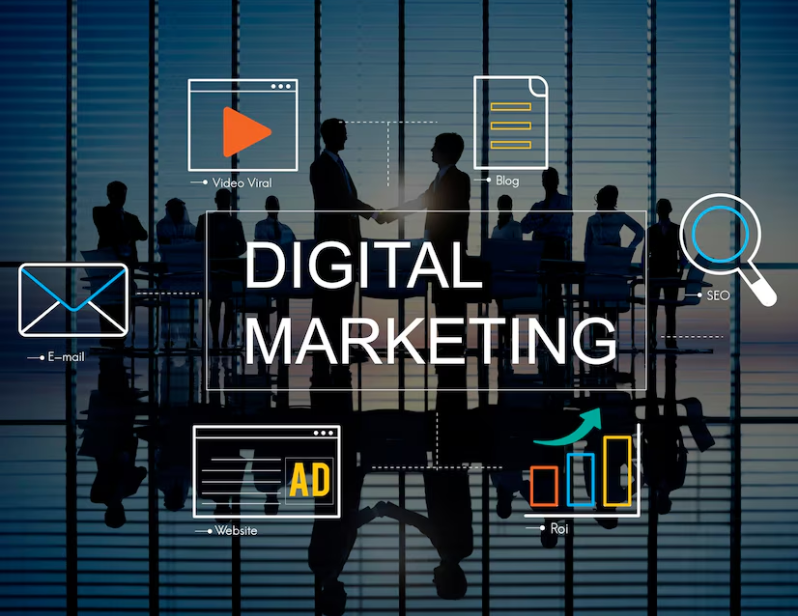In the simplest terms, Internet Marketing is promoting and selling products or services online. It involves using the internet to reach more people, share information, and attract customers. For example, imagine you own a small restaurant. Here’s how internet marketing can help you:
- Website: You create a website for your restaurant. This website has your menu, hours of operation, and location. People can visit your website to learn more about your restaurant.
- Social Media: You set up social media accounts on platforms like Facebook and Instagram. You post pictures of your delicious dishes, share updates, and interact with your customers. For example, you post a picture of a new dessert special and ask your followers to come try it.
- Online Reviews: Customers leave reviews about your restaurant on sites like Yelp or Google. Positive reviews attract more people. If someone says they had a great meal, others are more likely to visit.
- Email Marketing: You collect email addresses from your customers. You send them newsletters with special offers, upcoming events, or new menu items. For example, you send an email with a coupon for a free appetizer on their next visit.
- Online Advertising: You pay for ads on Google or social media. When people search for “best restaurant in town” or see a food-related post, your restaurant’s ad appears. This can bring new customers to your website and ultimately to your restaurant.
- SEO (Search Engine Optimization): You optimize your website so it appears higher in search engine results. When someone searches for “Italian restaurant near me,” your restaurant shows up at the top, increasing the chances they’ll visit you.
Understanding Internet Marketing
I hope you understand a little bit now what internet marketing is. Now, let’s go to a more complex definition. Internet marketing, also known as online marketing or digital marketing, involves promoting products or services over the internet.
It makes use of various digital channels such as search engines, social media, email, and websites to connect with potential customers. This method of marketing has absolutely changed and improved the way businesses reach and engage their target audience.
What is The Importance of Internet Marketing?
Internet marketing is extremely important for businesses today. No matter the niche you’re in, you must agree that you want more people to know about your business, you’ll like your business to have a certain level of online strength and dignity. It is the universal goal of most business owners afterall. True or false? Well, here's 5 major importance of internet marketing:
- Wider Reach: Unlike traditional marketing, internet marketing allows businesses to reach a global audience. It breaks geographical barriers, enabling brands to connect with potential customers from around the world.
- Cost-Effective: Digital marketing is often more affordable than traditional marketing. Small businesses, in particular, can benefit from cost-effective strategies like social media marketing and content marketing.
- Targeted Advertising: Internet marketing enables precise targeting. Businesses can create highly targeted ads based on demographics, interests, and online behavior, ensuring their message reaches the right audience.
- Measurable Results: One of the significant advantages of internet marketing is the ability to track and measure results. Analytics tools help businesses understand the effectiveness of their campaigns, allowing them to make data-driven decisions.
- Improved Customer Engagement: Social media and email marketing allow businesses to engage directly with their customers. This interaction fosters stronger relationships and improves customer loyalty.
The History of Internet Marketing
The history of internet marketing dates back to the early days of the internet. Here’s a brief but detailed timeline:
1990s: The Birth of the Internet
The internet became publicly accessible in the early 1990s. As more people started using it, businesses recognized the potential to reach a broader audience. The first banner ad appeared in 1994, marking the beginning of online advertising.
Late 1990s: Search Engines and SEO
Search engines like Yahoo and Google emerged in the late 1990s. This era saw the birth of Search Engine Optimization (SEO), where businesses began optimizing their websites to rank higher in search results.
Early 2000s: The Rise of Social Media
The early 2000s saw the rise of social media platforms like Friendster, MySpace, and eventually Facebook and Twitter. These platforms offered new and easier avenues for businesses to connect with their audience.
2010s: The Mobile Revolution
The widespread adoption of smartphones revolutionized internet marketing. Mobile-friendly websites and apps became essential, and businesses started making use of mobile advertising to reach their audience.
Present Day: Integrated Digital Marketing
Today, internet marketing is an integral part of any marketing strategy. Businesses use a combination of SEO, social media, email, content marketing, and PPC to create cohesive and effective campaigns.
6 Key Components of Internet Marketing
When it comes to the question, “what is internet marketing”, many people just gloss over it. They feel it’s a knowledge too difficult and probably unnecessary for them to know. Hence, most can’t even fathom that there are different aspects to this thing called digital marketing. So, just like a sandwich has the bread, the jam, the lettuce, etc, I’ll be shedding some light on the different components of internet marketing:
1. Search Engine Optimization (SEO)
SEO involves optimizing a website to rank higher in search engine results pages (SERPs). It includes on-page SEO (optimizing content and HTML source code) and off-page SEO (building backlinks).
2. Content Marketing
Content marketing focuses on creating and distributing valuable content to attract and engage a target audience. This content can be in the form of blog posts, videos, infographics, and more.
3. Social Media Marketing
Social media marketing leverages platforms like Facebook, Instagram, Twitter, and LinkedIn to promote products and engage with customers. It includes organic posts and paid advertising.
4. Email Marketing
Email marketing involves sending targeted emails to a list of subscribers. It's a powerful tool for nurturing leads, promoting products, and keeping customers informed.
5. Pay-Per-Click (PPC) Advertising
PPC advertising involves paying for ads to appear on search engines, social media platforms, and other websites. Advertisers pay a fee each time their ad is clicked.
6. Affiliate Marketing
Affiliate marketing involves partnering with affiliates who promote your products in exchange for a commission on sales. This strategy helps expand your reach and drive more sales.
5 Benefits of Internet Marketing
There are numerous advantages of incorporating the principles of internet marketing to your business. Some of them are:
1. Increased Visibility
Internet marketing increases your online visibility, making it easier for potential customers to find you. High search engine rankings and a strong social media presence can significantly boost your brand's visibility.
2. Enhanced Customer Insights
Digital marketing provides valuable insights into customer behavior. Analytics tools track user interactions, helping you understand your audience better and tailor your marketing efforts accordingly.
3. Higher Conversion Rates
With targeted advertising and personalized content, internet marketing can lead to higher conversion rates. Engaging content and strategic calls to action encourage customers to take the desired actions.
4. Better ROI
Internet marketing often delivers a higher return on investment (ROI) compared to traditional marketing methods. The ability to track and optimize campaigns ensures that your marketing budget is used effectively.
5. Flexibility and Adaptability
Digital marketing strategies can be quickly adjusted based on performance and market trends. This flexibility allows businesses to stay agile and respond to changing customer needs.
Challenges of Internet Marketing
While internet marketing offers numerous benefits, it also comes with challenges. But never fear. Like I say, challenges are just a means for you to figure out the solutions. Look at it as a learning curve instead of a difficulty that you can’t surpass. Let’s talk about the most common challenges:
- High Competition: The online marketplace is highly competitive. Standing out requires innovative strategies and continuous optimization.
- Constantly Changing Algorithms: Search engines and social media platforms frequently update their algorithms. Staying up-to-date with these changes is essential for maintaining your online presence.
- Data Privacy Concerns: With the rise of digital marketing, data privacy has become a significant concern. Businesses must comply with regulations and ensure they handle customer data responsibly.
Best Practices for Internet Marketing
To succeed in internet marketing, here are a few simple best practices to guide you:
- Create Quality Content: Content is king in digital marketing. Focus on creating high-quality, valuable content that addresses your audience's needs and interests.
- Optimize for Search Engines: Implement SEO best practices to improve your website's visibility in search engine results. This includes keyword optimization, quality backlinks, and user-friendly design.
- Engage on Social Media: Maintain an active presence on social media platforms. Engage with your audience, respond to comments, and share relevant content regularly.
- Utilize Email Marketing: Build and maintain an email list. Send personalized, relevant emails to keep your audience engaged and informed about your products or services.
- Measure and Analyze: Use analytics tools to track the performance of your campaigns. Analyze the data to understand what's working and what needs improvement.
- Stay Updated: Keep up with the latest trends and changes in digital marketing. Attend webinars, read industry blogs, and participate in online forums to stay informed.
Future of Internet Marketing
The future of internet marketing is promising, with advancements in technology shaping new trends:
- Artificial Intelligence (AI) and Machine Learning: AI and machine learning are transforming digital marketing. These technologies enable personalized marketing, predictive analytics, and automation.
- Voice Search Optimization: With the rise of voice-activated devices, optimizing for voice search is becoming crucial. Businesses need to focus on natural language keywords and conversational content.
- Video Marketing: Video continues to dominate online content. Live streaming, interactive videos, and short-form videos are gaining popularity, providing new opportunities for engagement.
- Augmented Reality (AR) and Virtual Reality (VR): AR and VR are enhancing customer experiences. Brands are using these technologies for virtual try-ons, interactive ads, and immersive experiences.
- Data-Driven Marketing: Data will continue to drive marketing strategies. Businesses will rely on data insights to create personalized and effective campaigns.
Conclusion
Internet marketing is an essential component of modern business strategies. It offers unparalleled reach, precise targeting, and measurable results. By understanding its importance, leveraging its key components, and staying updated with emerging trends, businesses can effectively navigate the digital landscape and achieve their marketing goals.
Embrace the power of internet marketing to connect with your audience, build your brand, and drive growth. The digital world is ever-evolving, and staying ahead requires continuous learning and adaptation. Start your internet marketing journey today and watch your business thrive in the online realm.
All images are sourced from freepik




